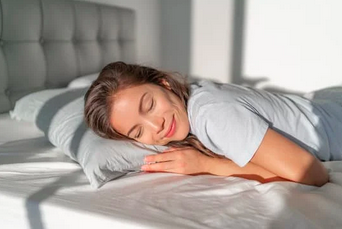If you are reading this article, you are probably struggling with your sleep. Insomnia is prevalent and a lot of people suffer from it at some point in their lives so you are not alone with this. So how do you know if you have insomnia and if you do, how can you help overcome it and learn to sleep beautifully again? Read this article to find out!
What is Insomnia?
Insomnia is one of the most common sleep disorders where people struggle to get the sleep they deserve to function well the next day, there are 3 different types of insomnia:
- Trouble getting to sleep otherwise known as sleep onset difficulties
- Trouble staying asleep due to multiple night wakings
- Wake up very early and have difficulty falling back to sleep
How does your insomnia show up for you? For me my insomnia normally manifests as trouble getting to sleep at night, for others it’s multiple night wakings, or getting up early and inability to fall asleep. But in some cases, people can suffer from a combination of the 3 different types of insomnia all at once, and boy that is tough and I feel their pain too.
How to Overcome Insomnia
It’s easier to overcome insomnia if it’s short term i.e. you’ve only had it for a few nights, then if you have had insomnia for longer periods. But not impossible! Read below for the sips to help you overcome insomnia:
- Throw strict bedtime routines away: all they do is create even more anxiety around the topic of falling asleep. If you have a list that includes lots of steps to follow, then it’s a case of trying too much to get to sleep. If you speak to someone who sleeps well and asks them what’s your routine, how do you try to sleep? They will look at you Blankley and have no routine to provide you with because you shouldn’t have to try to sleep. It should happen naturally, because the more you try -the hard it will come by
- Read a book in bed: reading in bed is one of the best ways to tire the mind out and get you in a good place to be ready to turn the lights out. I tend to read and read and read until my eyes are closing, then I turn the light out and welcome sleep. Warning: do not read thrillers or horror books as this will keep you up longer. Instead read history books, biographies, self-help books, or dramas which will not spike your nervous system with adrenaline and relax you instead
3 Listen to Hypnosis MP3s: these will also help calm your body and mind and prepare it for sleep. Not only will the hypnosis recordings do all of the above they will also distract your mind from worries and bring on sleep onset quicker. You can find hypnosis recordings via my YouTube Channel: Alex Saxton YouTube ChannelWarning: only listen or watch the hypnosis videos or recordings in a safe place like a bed or a chair and never when driving or operating machinery or you may fall asleep.
- Only turn the lights out when sleepy or tired: one of my golden star tips to help with sleep is to only switch the lights off when you are so tired you can’t keep your eyes open. If you turn the lights off before you are ready to sleep, then you will be lying and tossing and turning in bed for ages fully awake, and not only that, seeing as you are not doing anything in bed just lying there looking at the ceiling, your mind can be flooded with anxiety-producing worries or worries about the time and how late it is, which can make it even harder to fall asleep!
- Get rid of the time: stop looking at the clock or the time on your phone the minute you are in bed. Clock watching only creates more sleep anxiety and sleep anxiety = insomnia. The time is whatever the time is, checking it won’t change it, it will just make you anxious that you are still awake and not asleep! Trust me on this, stop checking the time and it will make sleep much easier to come by
- Make sure the room is cool: heat is not your friend when it comes to sleep. If your body is warm or hot, it will prevent you from becoming drowsy and falling asleep. Always make sure you feel cool in bed, sometime just having your feet hanging out the end of the covers is enough to keep you cool, and turning your pillow over to the cool side helps as well
- Change bedrooms: If you sleep badly in bed for more than two nights, I recommend you sleep in a different room, or sofa or change your room arrangement around for a few days. This is to stop your bedroom from becoming a trigger for insomnia and sleepless nights. If you continue to have insomnia in the same room for a long time, then your room environment can perpetuate insomnia because you associate it with anxiety and not sleeping, so move rooms for a while!
Last words…
You don’t have to live with insomnia or accept that is the way you will always sleep. You can overcome insomnia and learn to sleep beautifully again. Give these tips a go and good luck with your journey to getting the sleep you deserve.
If you need further assistance on overcoming insomnia or how to calm your mind down at night – check out my “Hypnosis for Insomnia” hypnotherapy service during which I can help you to feel calmer, reduce sleep anxiety and improve sleep in just a few weeks. To find out more – click this link Hypnosis for Insomnia
I’m a clinical hypnotherapist with over 15 years of experience, and to date, I have helped over 100 clients from Poole, Bournemouth, Southampton, Bath, London, Bristol, the United States, and as far afield as New Zealand to overcome anxiety. Regardless of where you reside, I am fully equipped to assist you in the same manner so do get in touch if you need my hypnosis help too. Here is the link to my website www.alexsaxton.com and here is the link to my calendar if you would like to book a consultation directly wwww.alexsaxtoncalendar.as.me
Disclaimer: The information provided in this blog is for educational and informational purposes only and the tips shared here are general and may not be suitable for everyone. I am not a medical doctor and the tips provided should not be considered a substitute for professional medical advice, diagnosis, or treatment. It is essential to differentiate between insomnia symptoms and potential underlying medical conditions. Sometimes, insomnia symptoms may be the first indicators of an underlying health issue. Therefore, if you are experiencing insomnia, it is recommended to consult with a qualified healthcare professional or a licensed medical doctor for proper evaluation and guidance first.



